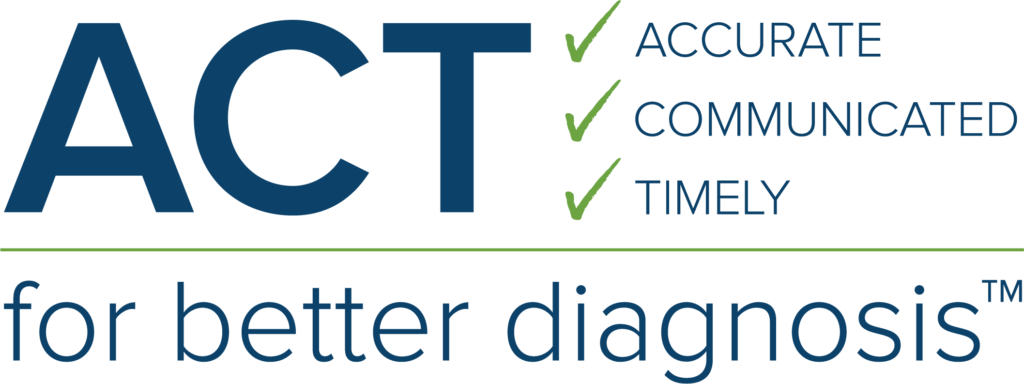The Coalition to Improve Diagnosis Welcomes Six New Member Organizations
Six leading healthcare organizations have pledged to take action to improve diagnostic quality and safety by joining the Coalition to Improve Diagnosis, which already includes many of the most prominent organizations in healthcare and patient advocacy. The new member organizations represent distinct healthcare sectors, including laboratory testing, hospitals, health systems, accreditation, and patient safety: the American Society for Clinical Laboratory Science (ASCLS), Ballad Health, Baystate Health, The Joint Commission, Northwell Health, and the Washington Patient Safety Coalition (WPSC).
These latest additions to the Coalition’s membership come on the heels of the September 2018 launch of ACT for Better Diagnosis™. Funded by the Gordon and Betty Moore Foundation and the Mont Fund, ACT for Better Diagnosis is an initiative created by the Society to Improve Diagnosis in Medicine (SIDM) and the Coalition to Improve Diagnosis to improve the diagnostic process by calling on organizations to identify and spread practical steps to better ensure diagnoses are Accurate, Communicated, and Timely.
Every nine minutes, someone in a U.S. hospital dies due to a medical diagnosis that was wrong or delayed. Researchers estimate that up to 80,000 deaths a year in U.S. hospitals can be attributed to inaccurate or delayed diagnoses.
“For too long, improving diagnostic quality and safety has not been on the radar of health organizations,” said Paul L. Epner, chief executive officer and co-founder of SIDM. “But that is changing, and it’s exciting to now see that a groundswell is building and taking hold across all sectors of health care. These healthcare leaders are recognizing that improving the diagnostic process saves lives, reduces harm, and will save costs to the system.”
Convened and led by SIDM, the Coalition to Improve Diagnosis is the only collaboration of diverse healthcare organizations singularly focused on improving the diagnostic process. Together, they work to find solutions that enhance diagnostic quality and safety, reduce harm, and ultimately ensure better health outcomes for patients.
The following six organizations have committed to ACT for Better Diagnosis by joining the Coalition and taking action to improve the diagnostic process:
American Society for Clinical Laboratory Science: The ASCLS has developed programs and products focused on educating patients and healthcare professionals to prevent wrong or delayed medical diagnoses associated with laboratory testing.
Ballad Health: Ballad Health is identifying evidence-based criteria for the appropriate testing of hospital-acquired infections, establishing appropriate use of CT and MRI imaging to improve stroke diagnoses, and creating an approach to accurately and quickly identify patients with sepsis.
Baystate Health: Baystate Health has made diagnostic excellence a major priority of their comprehensive patient safety program. It is committed to identifying opportunities to improve the diagnostic process and to implement solutions that will reduce harm from misdiagnosis. In order to achieve that goal, Baystate has organized interdisciplinary teams to study and act in many areas including clinical reasoning education, incident identification and review, electronic clinical decision support, quality improvement activities, and clinical pathway development.
The Joint Commission: As the nation’s largest healthcare accreditor, The Joint Commission provides best practices and rigorous standards to help organizations improve patient safety and quality of care. The Joint Commission is exploring current best practices to ensure appropriate follow-up of diagnostic tests and consults ordered as part of the diagnostic process, which is the focus of National Patient Safety Goal 02.03.01, to “report critical results of tests and diagnostic procedures on a timely basis.”
Northwell Health: Northwell Health developed and deployed trials to reduce diagnostic errors in emergency departments and ambulatory and inpatient clinical settings by focusing on the roles of the patient, family, and caregiver with a scripted “Teach-Back” intervention.
Washington Patient Safety Coalition: The WPSC voted in 2018 to elevate diagnostic improvement as one of its major programmatic goals for 2018 – 2019. To that end, they have organized a workgroup of stakeholders dedicated to this goal and are developing podcasts, blogs, a webinar series, and other resources on the topic. It will also be one of the key themes at their upcoming annual regional meeting, the Northwest Patient Safety Conference in May 2019, where Mark Graber and Sue Sheridan of SIDM will be the closing speakers.
As recently profiled in Modern Healthcare, the Coalition to Improve Diagnosis now includes more than 50 organizations representing clinicians, patients, health systems, researchers, and testing professionals. Collectively they acknowledge that improvement will require sustained work over several years with all stakeholders involved.
If your organization is interested in joining the Coalition to Improve Diagnosis and taking action towards improved diagnosis, please contact coalition@improvediagnosis.org or visit DxCoalition.org. More information on ACT for Better Diagnosis is available at www.BetterDiagnosis.org.

Stay Up-To-Date
Stay informed on that latest activities from members of the Coalition to Improve Diagnosis. Sign up to get regular ACT for Better Diagnosis updates delivered to your inbox.
